
|
Sale 64
| Lot |
Photo |
Description |
Realized |
Lot 406 |
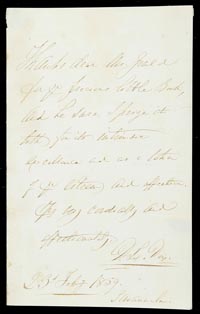 |
Dix, Dorothea Lynde (1802-1887) American reformer, pioneer in humane treatment of the insane; appointed Superintendent of Army Nurses during the Civil War. Scarce Autograph Letter Signed ("D. L. Dix"), 6¾ x 4¼ in., Savannah, Feb 23 1859. Sending a thank you to a gentleman in Augusta "for your precious little Book…I prize it both for its intrinsic excellence and as a token of your esteem and effection…." Very good.
Estimated Value $250 - 350.
View details and enlarged photo
| Unsold |
Lot 407 |
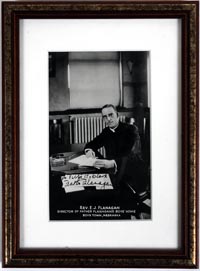 |
Flanagan, Father E.J (1886-1948) Roman Catholic clergyman who believed in rehabilitation and care for homeless boys. He incorporated his Nebraska home for "lost boys" as a separate minicipality outside of Omaha, thus giving his "community" a unique legal status. Father Flanagan was made famous in two Hollywood films about his Boys Town. Black-and-white Postcard Photograph Inscribed and Signed ("To Victor H. Clark / Father Flanagan), Boys Town, Nebraska, no date. Matted and framed to 7¾ x 5¾ inches. Fine.
Estimated Value $125 - 150.
View details and enlarged photo
| Realized
$89 |
Lot 408 |
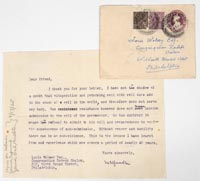 |
Gandhi, Mohandas Karamchand "Mahatma" (1869-1948) Indian nationalist and spiritual leader, recognized as "Father of the Nation." His use of the principle of non-violent resistance to gain civil rights and political independence influenced later leaders such as Dr. Martin Luther King, Jr., Nelson Mandela, Aung San Suu Kyi, Cesar Chavez, Benigno Aquino, Jr., and Lech Walesa.
Typed Letter Signed ("M K Gandhi"), with several holograph corrections, one page, 6½ x 8¼ in., Wardha (India), Mar. 15, 1935. To (Rabbi) Louis Wolsey, Congregation Rodeph Shalom in Philadelphia:
"I thank you for your letter. I have not a shadow of a doubt that vituperation and returning evil with evil does add to the stock of evil in the world, and therefore does not serve any body. Non resistance however does not mean passive submission to the will of the persecutor. On the contrary it means a refusal to submit to his will and preparedness to suffer the consequence of non-submission. Without prayer and humility there can be no non-violence. This is the lesson I have learnt from an experience which now covers a period of nearly 40 years."
The letter was typed with a purple ribbon and signed by Gandhi with purple ink. Very Fine. Pencil notations in left margin of letter were made by Rabbi Wolsey. Accompanied by the transmittal envelope with holograph address.
Estimated Value $5,000 - 6,000.
View details and enlarged photo
| Realized
$15,930 |
Lot 409 |
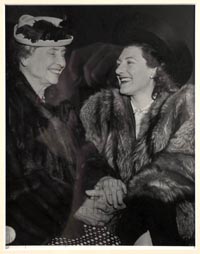 |
Keller, Helen (1880-1968) Political activist, author, educator. Black-and-white Photograph Inscribed and Signed, "To my fellow American Evie Hayes with warm thanks for her sweet thoughtfulness, Lovingly, Helen Keller, July 5th, 1948" on a vintage, matte-finish photo of Keller with Hayes (a famous musician and voice coach), 9¼ x 7¼ in., n.p. Very Fine. Signed in pencil by the deaf and blind Keller and hard to read because of the poor contrast between the inscription and the dark background.
Estimated Value $400 - 600.
View details and enlarged photo
| Unsold |
Lot 410 |
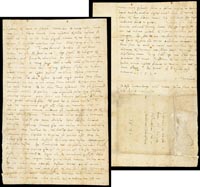 |
Luther, Martin (1483-1546) German ex-monk, scholar, and reformer credited with starting the Protestant Reformation. Autograph Letter Signed ("Martinus"), 2 pp, in Latin, 10¾ x 7 inches, September 15, 1530. Verso is trimmed at right margin, affecting several letters of text. Overall toning and some soiling; old repairs to address panel and to small fold tears.
In 1530, the Catholic Church, threatened by the new Protestant beliefs, convened the Diet of Augsburg in order to find a compromise to keep Christians united. Evangelism was represented at the Diet by Philipp Melanchton (1497-1560), a German scholar and humanist who collaborated with Martin Luther in spreading the Protestant Reformation. Luther could not travel for fear of his life. He remained in Coburg Fortress under the protection of Elector John the Steadfast but controlled the religious negotiations by instructing Melanchton via letters such as the present one.
Melanchton had presented his "Augsburg Confession," now considered the founding manifesto of Protestanism, to Holy Roman Emperor Charles V (1500-58) on June 25 1530 and was hoping to compromise. Luther, however, thought that the negotiations at this point were a failure and advised Melanchton to break off his fruitless efforts. Luther believed that both forms of the Eucharist--bread and wine--were necessary in order to receive the full participation with the teachings of Jesus; however it is the insistence of this principle that Luther thought would cause a breakdown in the Diet of Augsburg.
Luther writes, in part: "Mercy and Peace in the Name of Christ! Yesterday our young prince arrived together with Count Albrecht von Mansfeld, wholly unexpected guests. I was glad to see that they escaped this confusion; Oh, that I may see you soon escape as well, if it is not possible to see you (honorably) discharged. You have done much and too much, now it is in the hands of the Lord to settle it, and he will. Just be a man and set your hopes on Him! It infuriates and consoles me at the same time that Eck and the enemies cause obstructions with this futile sophistry, namely: If we demand both forms of the sacrament then we condemn the entire church and the Emperor himself. the wretched people have as a last resort that they talk their disgusting chatter in the emperor's ear while he is still there. We shall suffer them to abuse the emperor with such cajolery, with which they seriously challenge the one who has already flexed his bow with the deadly projectile. Because this is what the Turks say as well: It can not be assumed that such a grand people be condemned. If this argument should hold truth, then what article of faith remains to us to keep and believe in, if the articles of faith are dependent on the masses? You have confessed to Christ, offered peace, obeyed the emperor, suffered insults; you have been showered with blasphemy, and have not returned a wrong for a wrong: In sum, you have conducted the sacred business of the Lord in the most venerable way, as it befits the pious. Now enjoy the Lord for once, and be happy. You just ones (Psalm 32:11) You have long enough been saddened in the world: look up and lift your heads, your salvation is coming (Luke 21:28). I will sanctify you as true members of Christ. How can you strive for more honor? Or is it not enough to have served Christ faithfully and acted as an honorable part of him? That be far from you, that the grace of Christ is such a menial thing to you….
The prince gave me a gold ring, but so that I may see that I was not born to wear gold, it slipped off my thumb and fell to the floor right away (for it is a bit too wide for my fingers). Said: you are a worm, not a human (Psalm 21:7); it should have been given to Faber or Eck, for you lead or string would have been more fitting, or maybe a rope around your neck. The prince also wanted to give me the opportunity to return home and to take me with him, but I asked him to leave me here so that I may greet you and wipe the sweat off you after this bath. I wish and request that you be strong and of good spirits, so that you shall not become upset by the outer appearance of the recent events, for you know how much everything lies in the hand of Him who can darken the sky and brighten it again in the wink of an eye, and who does not only do that, but takes joy in it…."
The "Eck" to whom Luther bitterly refers is Dr. Johann Maier von Eck (1486-1543) a German theologian and defender of Catholicism who inveighed against Luther at every opportunity. Eck was the head Catholic theologian at Augsburg and was charged by the emperor with writing a refutation (Confutatio pontificia) to the Augsburg Confession. Johann Faber (1458-1571), also mentioned by Luther in this letter, became Bishop of Vienna in 1530 and attended the Diet of Augsburg; he coauthored the refutation to the Augsbug Confession.
Estimated Value $60,000 - 80,000.
Stargardt, June 28, 1990, lot 1328.
View details and enlarged photo
| Unsold |
Lot 411 |
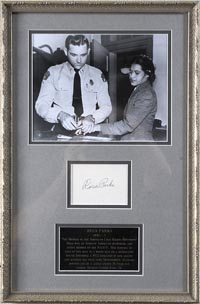 |
Parks, Rosa (1913-2005) African-American civil rights activist; her refusal to give up her seat on a bus to a white person prompted the Montgomery Bus Strike and played an important role in launching the Civil Rights Movement. Card Signed, "Rosa Parks," 2½ x 3½ in., n.p., n.d. Professionally matted and framed with a black-and-white image of Parks being fingerprinted by a Montgomery policeman, and an engraved, explanatory paragraph to an overall size of 19 x 12½ in. Very fine.
Estimated Value $200 - 250.
View details and enlarged photo
| Realized
$117 |
Lot 412 |
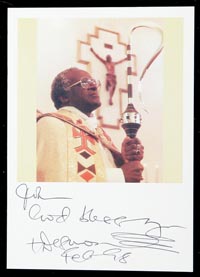 |
Tutu, Desmond (1931 -) South African cleric, Archbishop Emeritus of Cape Town; human rights activist; he won the Nobel Peace Prize in 1984. Photograph Signed and Inscribed, "John God bless you. Desmond Tutu," n.p., n.d. Very fine.
Estimated Value $50 - 75.
View details and enlarged photo
| Realized
$24 |
|
|